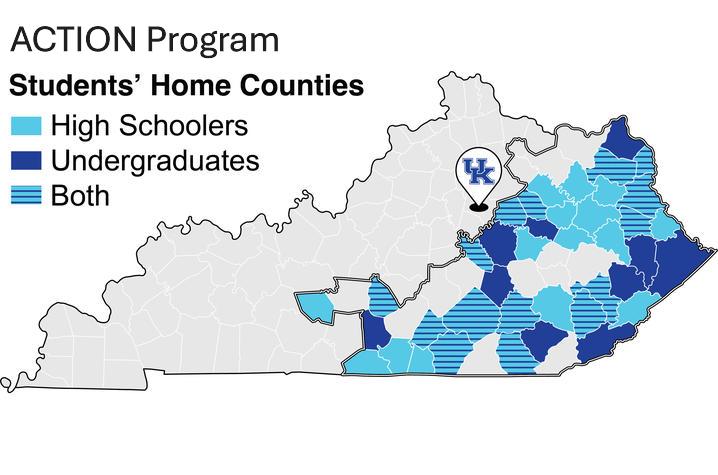ACTION Program works to prepare Kentucky students for careers in cancer research and clinical care

By Melissa Patrick
Kentucky Health News
The Foundation for a Healthy Kentucky‘s latest Health for a Change webinar focused on cancer disparities in Eastern Kentucky, with a look at a program that is working to prepare Kentucky high school and undergraduate students in the region for careers in cancer research and clinical care.
The two-year Appalachian Career Training in Oncology (ACTION) Program, launched in 2016, gives students the opportunity to gain cancer research, clinical, outreach and education experiences aimed at enriching their interest in pursuing a biomedical career with a focus on cancer-related careers.
So far, the program has engaged 155 students from 40 of Kentucky’s 54 Appalachian counties. Program results show that the majority of undergraduate alumni advance to graduate or professional programs, with 34 of them matriculating into medical school.
Beyond 20 peer-reviewed articles and other papers, the participants also have published three books that tell the stories of how cancer affects individuals and communities in Appalachia. The students also participated in a Photovoice project, which involved them taking pictures of things that reminded them of what cancer looked like in Appalachia.
Nathan Vanderford, director of the ACTION program, opened the webinar by talking about the cancer burden in Kentucky, noting that Kentucky ranks first nationally in cancer incidence rates and second in overall cancer deaths, with the greatest burden of the disease being in the Appalachian region of the state.
“Kentucky has a massive cancer problem,” he said. “What’s worse is that the cancer problem is significantly greater in Eastern Kentucky.”
Vanderford, who is also an associate professor at UK’s College of Medicine within the Department of Toxicology and Cancer Biology, said the ACTION program aims to address the behaviors and social determinants that drive the state’s high cancer rates, especially in Eastern Kentucky. These include the state’s high smoking and obesity rates, high rates of poverty, high rates of chronic infections, such as hepatitis C, low education and literacy rates and poor access to care.
He also spoke about cultural challenges in Appalachia that contribute to higher cancer rates, such as generational tobacco use or fatalistic views about health.
“It’s just sort of a perfect storm for a collection of risk behaviors, unhealthy health behaviors, social determinants of health, that drive the high rates of cancer in Kentucky,” he said.
Holly Burke, program coordinator of the ACTION Program, said students are recruited for the ACTION Program every two years, and the next recruiting year is at the end of 2025.
“We recruit 20 students,” Burke said. “So it is a pretty highly competitive program because we are recruiting from all 54 counties.”
Burke is also the program coordinator for the Summer Health Experience (SHE) in Oncology Program, a two-week online program for females and underrepresented people in medicine.
“This is an opportunity for students to participate in a lab experiment completely at home for free,” Burke said. It also features expert speakers and activity leaders from all facets of cancer, including cancer research, healthcare, personal development and more, according to the website.
This program, which takes place in July, also only takes 20 students, but from all over Kentucky.